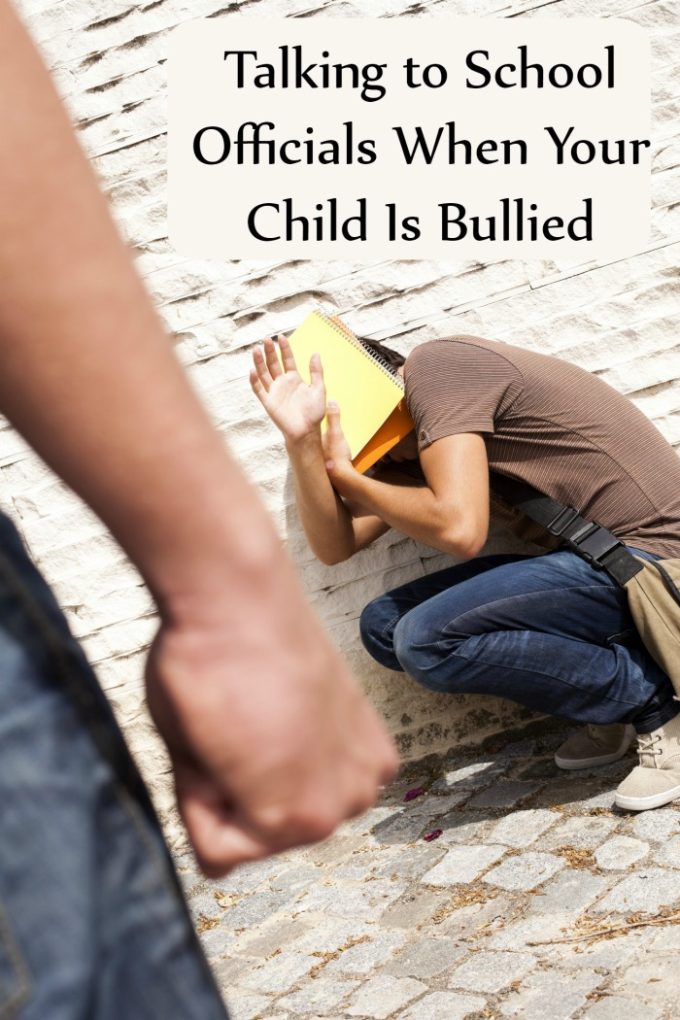Today’s guest article is very important to me because my son spent years being bullied in elementary school with very little response from the school officials. I feel like I was at a loss for how to talk to them to get them to actually listen. Authors Laurie Berdahl, MD and Brian D. Johnson, Ph.D., have put together a fantastic guide for how to talk to the school and get a response when your child is bullied. It’s a must-read for any parents of school age kids! Check it out, then grab their book, WARNING SIGNS: How to Protect Your Kids from Becoming Victims or Perpetrators of Violence and Aggression (affiliate).
Talking to School Officials When Your Child Is Bullied to Get a Response
By Laurie Berdahl, MD & Brian D. Johnson, PhD
Discovering that another child is intentionally harming yours can justifiably cause anger—it certainly brought out the mama- and papa-lion in us! Bullying is when someone perceived to have more physical or social power tries to harm a victim who wants it to stop, either in person or via peers or technology. Bullies try to harm people physically, psychologically, or socially.
If your kids are being bullied, the first step is to ask exactly what is happening and where, say it isn’t their fault, and that you’re glad they told you because now you can work together to stop it. Then discuss things to try, such as not showing emotion, politely but firmly looking a bully in the eye while saying, “Please stop,” or saying something totally off topic while moving away from the bully.
If ineffective, or your child doesn’t feel comfortable doing these things (being bullied can be scary!), ask teachers or other adults likely to witness bullying in classrooms, hallways, lunchrooms, busses, or at recess to intervene. They could say to the bully, “That’s bullying, and we don’t do that here” (without referring to your child), and then have the bully move to another area. Then they can support your child by asking, “Are you OK? Please tell me if it happens again.”
If bullying doesn’t stop, the next step is to meet with the principal, the bully’s parents, and involved counselors, coaches, and teachers—but not your child or the bully. How you approach this meeting is crucial for a good response. Although it might be tough, don’t accuse, criticize, or threaten officials, the bully’s parents or their child to avoid raising counterproductive defensiveness. But do act concerned about your child and the bully: you could say, “We want every student, including yours and ours, to have the best possible learning experiences and relationships in school.”
Specifically describe things happening to your child and say that you’d like them to stop. Examples are verbal or electronic bullying (such as making fun of the way your child dresses, talks, acts, or looks, or threatening, taunting, humiliating, purposefully excluding, making sexual comments, or spreading rumors), or physical bullying (like spitting, tripping, hitting, pushing, rude hand gesturing, or stealing or breaking possessions).
Ask everyone to work with you to make an action plan to stop the bullying and then discuss it with your child. But don’t ask for a bully’s suspension because there’s often retaliation upon return. Also, don’t allow your child meet with a bully to “resolve the conflict” (bullying is not a conflict situation but a victimization situation) which can further traumatize your child. Schools can make discipline and support plans with a bully’s parents but they often can’t tell you about them. Repeat meetings until bullying stops.
If you can’t get a satisfactory plan in place, or believe bullying is being ignored, you can try saying this to school officials: “I feel like we’re not getting anywhere. Who can I write to at the district administration level to start a paper trail on this situation?” If unsatisfied with the plan or progress, you can meet with your school superintendent or state’s Department of Education officials, or ask the state to investigate.
If school officials don’t intervene appropriately, or attempt to but can’t achieve adequate results, your child needs even more help. Active support from you as parents or guardians, siblings, friends, and extended family, so that it isn’t a secret but a widely addressed problem, is crucial. Here are key elements to include:
- Include your child in plans to ensure comfort and input.
- Build up self-esteem by pointing out strengths, talents, character, and how fortunate you feel to have your son or daughter in your life.
- Teach coping skills (talking through and expressing emotions and problem solving).
- Assure that being bullied has nothing to do with and isn’t your child’s fault but is all about the bully.
Finally, assure your child that because you care, you won’t stop working until the bullying stops. You’ve got their backs!






great article! i have same situation too. My son was bullied last 2 months and i have talked to the school too and the child. Thanks for sharing. 🙂
Just because it happens in school, doesn’t mean we can’t get involved. We have every right to make sure that our kids our safe. I love these suggestions that you have, they are definitely worth trying out. Bullying needs to stop, the earlier the better.
Such a great information, my son was a bully victim, He is in a trauma for a months. Thanks God he’s okay now.
Consider what outcome you would like to achieve from the meeting, whether it’s increased supervision, disciplinary action against the bully, or support for your child.